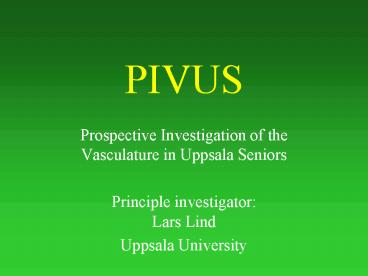PIVUS
1 / 49
Title:
PIVUS
Description:
PIVUS –
Number of Views:51
Avg rating:3.0/5.0
Title: PIVUS
1
PIVUS
- Prospective Investigation of the Vasculature in
Uppsala Seniors - Principle investigatorLars Lind
- Uppsala University
2
PIVUS
- Investigation of 1000 subjects aged 70 from the
general population - Primary aim
- To investigate endothelial function as a
prospective CV risk factor in elderly subjects
3
1016 subjects investigated in June 2004
- 3.5 years of inclusion of subjects
- 2 nurses half-time ( Kerstin, Nilla/Anna)
- 1 Laboratory technician full-time (Janne)
- 1 physician 30 (Lars)
- Participation rate of 51
- 51 females
4
Investigations
- 3 tests of endothelial function
- 3 tests of arterial compliance
- Echocardiography
- Blood pressure
- Carotid a. ultrasound
- Body composition (DXA)
- Cardiac autonomic function (HRV, BRS)
- ECG
- Medical/drug history
- Dietary records -7days
- Smoking habits
- Exercise habits
- Blood sampling
- Lung function
- MRI angiographyheart
- DNA sampling
5
History of CV diseases
- Myocardial infarction 7.1
- CABG/PTCA 5.0
- Stroke 3.3
- Hypertension medication 30
- Diabetes 7.4
- Lipid medciation 13
- CHF 4.9
- CV medication 47
6
Endothelial function measurements
7
Invasive forearm technique
Bild arm/nål
8
Invasive forearm technique
- Measurements of resting forearm blood flow with
venous occlusion plethysmography - Infusion of Acetylcholine 25 and 50 ug/min to
evaluate endothelial function
- Infusion of sodium nitroprusside 5 and 10 ug/min
to evaluate endothelium-independent vasodilation
Bild pump
9
Brachial ultrasound technique
Bild mätning
10
Brachial ultrasound technique
- Measurements of the brachial artery diameter and
flow at rest - Re-evaluation after 5 min of flow occlusion in
the forearm during the hyperemic state - Flow-mediated vasodilation (FMD) is the degree of
increase in diameter during hyperemia
11
FMD
At rest
During hyperemia
12
Pulse wave analysis
- Measurements of radial artery pulse wave with
aplanation tonometry beftore and 15 min following
injection of terbutaline 0.25mg sc - Main read-outs are the relative changes in the
amplitudes of the reflected systolic and first
diastolic waves (b/a and d/a at a following
figure).
13
Pulse wave analysis
Bild Nilla
14
Pulse wave analysis
Bild skärm
15
(No Transcript)
16
Arterial compliancemeasurements
17
Compliance in the carotid aretery measured by
ultrasound
- Diameter in the commmon carotid artery is
measured in diastole and systole and this
diameter change is related to the pulse pressure. - One calculation performed is the elastic modulus
18
Compliance measurements in carotid artery
19
Compliance evaluated by pulse wave analysis
- The augmentation index obtained by pulse wave
analysis could be used as an index of arterial
compliance - Another index or compliance is to measure the
time between the systolic peak and the first
reflected diastolic wave and divide by the length
of aorta (half height). Gives an estimate of
pulse wave volocity.
20
Total arterial compliance
- Stroke volume is measured by echocardiography
- stroke volume/pulse pressure ratio is obtained by
dividing by the pulse pressure
21
12 lead ECG recording
bild
22
ECG
- Minnesota-coding for prevalences of abnormalities
- 5-min digital recordings for calculations of QT
dispersion and QT variability
23
Echocardiography
24
Echocardiography
25
Variables measured at echo
- Left atrial diameter
- Left ventricular dimentions (IVS, LVEDD,
PW,LVESD) - Calculated and globally estimated ejection
fraction - Stroke volume and cardial index
- E/A-ratio
- Isovolumetric relaxation period
- Ejection time
- Myocardial performance index
- Atrio-ventricular plane displacement
26
M-mode to determine LVmassStroke Volume and EF
27
Doppler-derived indices-E/A-ratio
28
Myocardial performance index
MPI(a-ET) / ET(ICTIVRT) / ET
a
Velocity
ET
Mitral flow
Mitral flow
Velocity
IVRT
ICT
29
Ultrasound of the carotid arteries
- Occurence of plaque
- Visual and quantitative evaluation of the gray
scale in plaque - IMT in the far wall in the bulb and CCA
30
Carotid artery ultrasound
31
Carotid artery IMT
32
5 min recording of BP and HR
Bild hörlur
33
Cardiavascular autonomic function
- 5-min recordings of ECG and invasive blood
pressure - Analysis of baroreceptor sensitivity by sequence
and spectral analysis methods - Spectral analysis of RR-interval and blood
pressure
34
Variability in HR and BP
35
Sequences BRS
36
Spectral analysis
37
Dietary assessment
- Self reported dietary intake over 7 days
38
7 days dietary records
39
Anthropometry
- Height
- Weight
- Waist/hip ratio
- BMI
- Waist height
Bild måttband
40
Manually measured blood pressure
Bild Kerstin
41
MR investigation-headed by Håkan Ahlström
- Whole-body MR angiography
- Cardiac MR for left ventricular dimentions, mass,
stroke volume AV plane displacement - Myocardial infarction diagnosis by Gd late
enhancement
42
MRI angiography
43
Myocardial late enhancement- a sesitive way to
detect infarction
44
Body composition by DXA-headed by Karl Mikaelsson
- Bone mineral density
- Fat mass
- Lean body mass
45
DXA measurement(Karl Michaelsson, SH)
46
BMD,lean massand fat
47
Lung function measurements
- Vital capacity
- Peak expiratory flow
- FEV1
48
Lung function - COPD
49
Blood, plasma and serum have been frozen for
analysis of
- Lipids
- Inflammation
- Coagulation
- Oxidative stress/antioxidants
- Immunology
- DNA
- Metabolism
- Rheology































